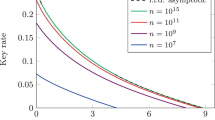Abstract
In this paper, we propose two controlled probabilistic quantum key distribution protocols with AKLT states. An AKLT state is a gapped ground state with minimum energy, and owing to the properties of this special state, our proposed protocols incorporate not only the measurement uncertainty in quantum phenomena (entanglement swapping with 1/4 probability) but also additional randomness (Bell measurement on two physical particles with 1/3 probability), in comparison with other PQKD schemes. Therefore, our protocols are more suitable for use by two mutually untrusted communicants, with no authenticated intermediate channel, allowing them to obtain an unpredictable, and therefore secure, key.






Similar content being viewed by others
References
Bennett, C.H., Brassard, G.: Quantum cryptography: public key distribution and coin tossing (invited paper). In: Proceedings of IEEE International Conference on Computers, Systems and Signal Processing, Bangalore, India, pp. 175–179 (1984)
Bennett, C.H.: Quantum cryptography using any two non-orthogonal states. Phys. Rev. Lett. 68, 3121–3124 (1992)
Bruss, D.: Optimal eavesdropping in quantum cryptography with six states. Phys. Rev. Lett. 81(14), 3018–3021 (1998)
Long, G.L., Liu, X.S.: Theoretically efficient high-capacity quantum key distribution scheme. Phys. Rev. A 65, 032302 (2002)
Ekert, A.K.: Quantum cryptography based on Bell’s theorem. Phys. Rev. Lett. 67, 661–663 (1991)
Gan, G.: Quantum key distribution scheme with high efficiency. Commun. Theor. Phys. 51(5), 820–822 (2009)
Li, C., Song, H.S., Zhou, L., Wu, C.F.: A random quantum key distribution achieved by using Bell states. J. Opt. B Quantum Semiclass. Opt. 5(2), 155–157 (2003)
Song, D.: Secure key distribution by swapping quantum entanglement. Phys. Rev. A 69(3), 034301 (2004)
Ma, X.F., Qi, B., Zhao, Y., Lo, H.K.: Practical decoy state for quantum key distribution (2005). arXiv:quant-ph/0503005v5
Deng, F.G., Long, G.L., Liu, X.S.: Two-step quantum direct communication protocol using the Einstein–Podolsky–Rosen pair block. Phys. Rev. A 68, 042317 (2003)
Deng, F.G., Long, G.L.: Controlled order rearrangement encryption for quantum key distribution. Phys. Rev. A 68, 042315 (2003)
Biham, E., Boyer, M., Boykin, P.O., Mor, T., Roychowdhury, V.: A proof of the security of quantum key distribution. In: Proceedings of the Thirty-second Annual ACM Symposium on Theory of Computing, Portland, Oregon, USA, pp. 715–724 (2000)
Gottesman, D., Lo, H.K.: Proof of security of quantum key distribution with two-way classical communications. IEEE Trans. Inf. Theory 49(2), 457–475 (2003)
Lo, H.K., Chau, H.F.: Unconditional security of quantum key distribution over arbitrarily long distances. Science 283, 2050–2056 (1999)
Mayers, D.: Unconditional security in quantum cryptography. J. ACM 48, 351–406 (2001)
Lo, H.K., Ma, X., Chen, K.: Decoy state quantum key distribution. Phys. Rev. Lett. 94, 230504 (2005)
Ben-Or, M., Horodecki, M., Leung, D.W., Mayers, D., Oppenheim, J.: The universal composable security of quantum key distribution. In: Proceedings of the 2nd Theory of Cryptography Conference, Lecture Notes in Computer Science/Security and Cryptology, vol. 3378, Cambridge, MA, USA, pp. 386–406 (2005)
Hwang, T., Tsai, C.-W., Chong, S.-K.: Probabilistic quantum key distribution. Quantum Inf. Comput. 11(7–8), 615–637 (2011)
Chong, S.K., Hwang, T.: Quantum key agreement protocol based on BB84. Opt. Commun. 283(6), 1192–1195 (2010)
Chong, S.K., Tsai, C.W., Hwang, T.: Improvement on “quantum key agreement protocol with maximally entangled states”. Int. J. Theor. Phys. 50(6), 1793–1802 (2011)
Hsueh, C.C., Chen, C.Y.: Quantum key agreement protocol with maximally entangled states. In: Proceedings of the 14th Information Security Conference (ISC 2004), National Taiwan University of Science and Technology, Taipei, Taiwan, pp. 236–242 (2004)
Tsai, C.W., Chong, S.K., Hwang, T.: Comment on quantum key agreement protocol with maximally entangled states. In: Proceedings of the 20th Cryptology and Information Security Conference (CISC 2010), National Chiao Tung University, Hsinchu, Taiwan, pp. 210–213 (2010)
Tsai, C.W., Hwang, T.: On “quantum key agreement protocol”. Technical Report, C-S-I-E, NCKU. R.O.C, Taiwan (2009)
Zhou, N., Zeng, G., Xiong, J.: Quantum key agreement protocol. Electron. Lett. 40(18), 1149–1150 (2004)
Affleck, I., Kennedy, T., Lieb, E.H., Tasaki, H.: Valence bond ground states in isotropic quantum antiferromagnets. Commun. Math. Phys. 115, 477–528 (1988)
Liu, L.L., Hwang, T.: Controlled remote state preparation protocols via AKLT states. Quantum Inf. Process (2014). doi:10.1007/s11128-014-0757-3
Chen, X., Zeng, B., Gu, Z.C., Yoshida, B., Chuang, I.L.: Gapped two-body Hamiltonian whose unique ground state is universal for one-way quantum computation. Phys. Rev. Lett. 102, 220501 (2009)
Kempe, J., Bacon, D., Lidar, D.A., Whaley, K.B.: Theory of decoherence-free fault-tolerant universal quantum computation. Phys. Rev. A 63, 042307 (2001)
Nguyen, B.A.: Joint remote state preparation via W and W-type states. Opt. Commun. 283, 4113–4117 (2010)
Darmawan, A.S., Bartlett, S.D.: Optical spin-1 chain and its use as a quantum-computational wire. Phys. Rev. A 82, 012328 (2010)
Kaltenbaek, R., Lavoie, J., Zeng, B., Bartlett, S.D., Resch, K.J.: Optical one-way quantum computing with a simulated valence-bond solid. Nat. Phys. let. 6, 850–854 (2010)
Coello, J.G., Bayat, A., Bose, S., Jefferson, J.H., Creffield, C.E.: Spin filtering and entanglement swapping through coherent evolution of a single quantum dot. Phys. Rev. Lett. 105, 080502 (2010)
Fan, H., Korepin, V., Roychowdhury, V.: Entanglement in a valence-bond solid state. Phys. Rev. Lett. 93, 227203 (2004)
Gao, F., Lin, S., Wen, Q.Y., Zhu, F.C.: A special eavesdropping on one-sender versus n-receiver QSDC protocol. Chin. Phys. Lett. 25(5), 1561–1563 (2008)
Qin, S.J., Wen, Q.Y., Meng, L.M., Zhu, F.C.: Comment on “Controlled DSQC using five-qubit entangled states and two-step security test”. Opt. Commun. 282(13), 2656–2658 (2009)
Gao, G., Qin, S.J., Wen, Q.Y., Zhu, F.C.: Cryptanalysis of multiparty controlled quantum secure direct communication using Greenberger–Horne–Zeilinger state. Opt. Commun. 283(1), 192–195 (2010)
Nielsen, M.A., Chuang, I.L.: Quantum Computation and Quantum Information. Cambridge University Press, Cambridge (2000)
Author information
Authors and Affiliations
Corresponding author
Rights and permissions
About this article
Cite this article
Liu, LL., Hwang, T. Controlled probabilistic quantum key distribution using a ground state. Quantum Inf Process 14, 989–1003 (2015). https://doi.org/10.1007/s11128-014-0901-0
Received:
Accepted:
Published:
Issue Date:
DOI: https://doi.org/10.1007/s11128-014-0901-0




